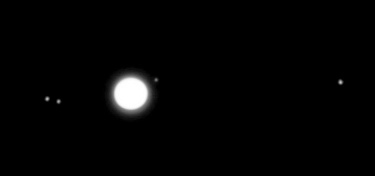How to find the king of planets
Reporter: Dion Heap
Date published: 04 October 2011

Jupiter: huge in the sky
Jupiter, the biggest planet in the solar system, is discussed by our local astronomer.
If you’re a late-night person, you may have noticed on the occasional clear nights we’ve had over the past few weeks a rather large, bright star rising from the east at around midnight, climbing higher and earlier with each night.
That’s no star! That’s Jupiter, the largest planet in our solar system.
Jupiter is a gas giant, mostly made of hydrogen and helium.
It is huge, in fact at 11 times the diameter of the Earth, it’s mass is 2.5 times the mass of all the other planets in our solar system combined.
Jupiter has a very fast rotation, the fastest of all the planets in fact, and it isn’t actually round. It’s slightly elliptical as it’s rate of spin forces it to stretch outwards slightly as it does a full rotation in a little under 10 hours.
Through a pair of binoculars, you may see the shape of the planet, but also a couple of its four main moons (out of the 64 or so around it) stringing out at the sides.
Through even more powerful binoculars or a telescope, you may see a little detail.
Jupiter has a striped atmosphere, composed of light and dark bands of turbulence, which alter slightly over the years.
It’s a very stormy planet, and one such storm creates what is known as the great red spot, a storm that has been going on since at least the 17th century and which is bigger than the Earth. And we complain about the weather in England!
If you want to spot Jupiter, over the next few weeks look eastward at around 11pm and scan upwards and to the right, somewhere in that path you will see what appears to be a very bright star.
If you want to go further and have a computer with Internet access, there is a free piece of software called Stellarium. It’s a free download and provides a simple planetarium, all you have to do is tell it where in the world you are and it provides a graphical representation of the night sky around you.
You could also look for Google Sky which is also available for anyone with a smartphone.
If you’d like to learn more, or are considering buying a telescope and want advice, please join the forum on my website at www.astronomyshed.co.uk
Most Viewed News Stories
- 1The Oldhamers handed awards in King’s New Year’s Honours List
- 2You can score free tickets to a Latics game while supporting Dr Kershaw’s Hospice
- 3Public inquiry announced into rail upgrade that could leave villages ‘cut off’ for months
- 4Primary school in Uppermill considers introducing new ‘faith-based’ entry criteria to tackle...
- 5Tributes paid following death of hugely respected Oldham community figure Dale Harris




